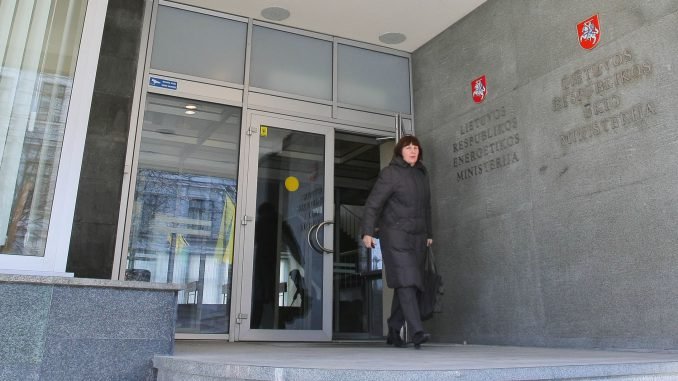
The new Seimas term begins on Monday, with the Peasant and Greens fraction claiming to hold almost 60 members of 141. As such its proposals will have to be considered by both its coalition partners the Social Democrats and the opposition. With the Seimas not having started work yet, there is already talk of the Ministry of Energy being abolished. PM Algirdas Butkevičius assures that the Social Democrats were the ones who proposed to abolish it because all the strategic objects are already completed. A questions remains – what will become of the memorandum signed with Hitachi in 2014 by a Minister of Energy from the Butkevičius cabinet?
The new coalition government appears to have come to terms on state energy supply.
“It was specifically us, the Social Democrats who proposed it, that the Ministry of Energy has few functions because its main strategic objectives are accomplished,” said PM Butkevičius.
“The Ministry of Energy was established due to one particularly significant project – the Visaginas nuclear power plant. The project will not be implemented, that is clear to everyone already,” LPGU Chairman Ramūnas Karbauskis said.
The Ministry of Energy was established in 2009 when the level of energy security in Lithuania was at a critical level with the closure of Ignalina nuclear power plant and no alternatives existing to Gazprom. The government was seeking to return the energy infrastructure into its own hands – the LEO project was abolished, the Conservative government of Andrius Kubilius decided to implement the energy strategy created by a prior Social Democrat government, which envisioned Lithuania remaining a nuclear energy state.
Later on the Visaginas nuclear power plant project arose, one which the Butkevičius government wavered about for four years, unable to express a clear position. It can only be guessed what impression the investor Hitachi was left by such behaviour on part of the Lithuanian government.
Electricity infrastructure synchronisation with other European networks is still awaiting its turn. The Ministers of Energy of the Baltic States have signed a declaration of energy security, which expresses a common commitment among the three states to synchronise their electricity infrastructures with continental European ones. In order to achieve synchronous operation and switching to European frequencies, it is necessary to complete the second connection with Poland. Along with this part, it is also necessary to connect gas networks. This way the countries would be fully integrated into the common European energy grid. The Ministry of Energy is also responsible for negotiations with the European Commission over the financing of Ignalina nuclear power plant closure after year 2020.
Now, however, the Peasant Greens, who won the elections, assure that the Ministry of Energy is no longer necessary.
“This does not require a ministry, a department or deputy level individual is sufficient to curate those questions,” stated R. Karbauskis.
Former Deputy Minister of Energy Romas Švedas says that Lithuania will still need vast efforts and competences in seeking its goals, thus it is necessary to increase, not abolish the negotiation capacities of the Ministry of Energy. In negotiations on synchronising with the rest of continental Europe, Russia will undoubtedly seek to use its geopolitical and technical advantages in the shape of Kaliningrad Oblast.
“Abolishing the Ministry of Energy at this stage would be premature because the energy independence of Lithuania is still fragile. According to the State Security Department Lithuanian energy security is a priority topic of Russian Federation interests here in Lithuania and closing down the Ministry of Energy would be as if lowering a political flag, that energy is no longer a priority in Lithuania, which would please the Russian Federation greatly,” explained independent energy infrastructure expert R. Švedas.
For now there are talks of the Ministry of Energy’s functions being divided between the ministries of transport and communications, and economy.
“If the Peasant Greens declare that synchronisation is a strategic goal, then the question rises, who should accomplish the task. If this is passed to the Ministry of Transport and Communications, then the ministry should be moved not to Kaunas, but to Brussels, such is the scope and workload. Regarding the Ministry of Economy it is also a question. We have yet to experience the nominated minister’s competence. Not only in Brussels, but overall in matters of national significance,” said independent analyst Rytas Staselis.
The new coalition has agreed that the Ministry of Transport and Communications is to be headed by the Peasant Greens, but no names of potential candidates have been brought up yet.
The Social Democrats have nominated their candidate to Minister of Economy, it would be Mayor of Jonava Mindaugas Sinkevičius. It is declared that Sinkevičius has studied economy and law in the Vilnius and M. Romeris universities, while he defended his doctoral thesis “The consumption of alcohol in the context of controversial public and personal factors” at the ISM Management and Economics University. It is said that a larger part of the Ministry of Energy’s functions is to go to specifically the Ministry of Economy, specifically a department under its wing. As such the competence of the minister is crucial here.

Be the first to comment